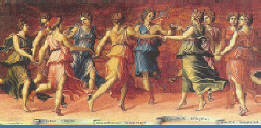|
|
Gray was born in London to a family of modest means whose income mainly derived from
his mother's milliners shop. The only survivor of twelve children, his early childhood
was disturbed by parental differences until he was removed by his mother to Eton College
for education under the protection of his maternal uncle who was an assistant master.
He found the atmosphere congenial and formed close friendships with significant figures
of later years.
He attended Peterhouse, Cambridge from 1734 where his interest in poetry took practical
expression; but he left in 1738 without a degree. From 1739, he travelled on the grand tour with Horace Walpole through France, Geneva and Italy developing his interest in literature and attempting his own verse. He quarrelled with Walpole and returned to England alone in 1741 resuming old friendships and beginning serious composition before returning to seek a law degree at Cambridge aided by a small inheritance from his father's death in that year. He began composition at his mother's retirement home in Stoke Poges, possibly extending over several years, of his most famous work, "Elegy Written in a Country Churchyard", published to enormous acclaim in 1751.
Whilst still residing at Cambridge, he devoted himself to further poetry, producing two
Pindaric odes and achieving further fame from several publications of modest length.
He eschewed publicity, however, declining the laureate and retreating to private study
of Greek and gaining extensive knowledge of the arts. He died of gout in 1771 unmarried
and is interred at Stoke Poges where one of several monuments erected to his memory
can be seen.
He is widely regarded as one of the leading 18th century poets and as a significant link
from the prevailing classical style of the age to the later Romantics.
|

